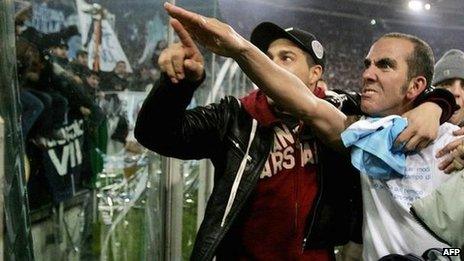Di Canio: David Miliband quits Sunderland role
- Published
- comments

Paolo Di Canio was fined and received a one-match ban in Italy for making this salute in 2005
Ex-foreign secretary David Miliband has resigned from the board of Sunderland football club over new head coach Paolo Di Canio's "past political statements".
Mr Di Canio has previously described himself as "a fascist, not a racist".
Mr Miliband had been serving as the club's vice-chairman and as a non-executive director.
He said he wished the club "all success in the future. It is a great institution that does a huge amount for the North East".
BBC political correspondent Chris Mason said Mr Miliband's decision to stand down was entirely to do with Mr Di Canio's appointment and nothing to do with his forthcoming move to New York to work for a charity.
Mr Di Canio - who has praised former fascist dictator Mussolini as "a very principled ethical individual" who was "deeply misunderstood" - was pictured in 2005 making a raised-arm salute to a group of supporters of Italian club Lazio, where he was playing.
He was given a one-match ban and fined £7,000 for the incident, and was also banned for a match following a similar incident earlier in 2005.
In 2011, when Mr Di Canio was appointed as Swindon Town's manager, the GMB union withdrew its sponsorship of the club, citing his political views.
Mr Miliband joined the Sunderland board in February 2011 after retiring from frontline politics in the aftermath of losing the Labour leadership race to his brother Ed.
He said last week he was quitting as Labour MP for South Shields to take up a role with the International Rescue Committee in New York.
Former Swindon Town chairman Jeremy Wray, who gave Mr Di Canio his first managerial job, described Mr Miliband's resignation as a "kneejerk response".
"I doubt if David Miliband has ever met Paolo Di Canio. I have known him for two years and I don't think politics was discussed once," he said.
"Paolo had many strong views. He probably had views on whether Italy should be in the euro, gay marriage and the endangered Siberian tiger but I doubt it's relevant to keeping Sunderland in the Premiership."
Campaign group Unite Against Fascism said it was "not surprised" by Mr Miliband's decision and called on Mr Di Canio to retract comments on his political views.
"If he wants to be a manager and wants to be a public figure, he needs to make it clear he accepts these views are completely inappropriate," joint national secretary Weyman Bennett said.
It was "simply not true that you can say you agree with fascism and that's okay - it's something that isn't acceptable", he added.
'Extreme views'
Sunderland City Council deputy leader Henry Trueman, meanwhile, said "extremism is the last thing we need in football" and said he hoped Mr Di Canio "comes as a football manager and keeps his politics to himself".
Sports journalist Gabriele Marcotti has written a biography of Mr Di Canio and suggested the club appointment would always upset some people.
He told BBC 5 Live: "I've known him very well for the last 15 years. There's no question that he's not a racist.
"His record, his friendships, his relationships pretty much speak for themselves.
"As to why Miliband resigned, he's a politician and I can understand why he's concerned about being associated with certain people - especially the way some people are bound to depict Paolo."
Martyn McFadden, editor of Sunderland football fanzine A Love Supreme, told the BBC there had been "a massive reaction" on the publication's website.
"A lot of fans are upset about the connection with these extreme political views," he said.
"Others are saying, 'let's keep politics out of football and make sure that Sunderland stay in the division'."
Mr Di Canio first came to Britain as a player in 1996 when he joined Celtic, and followed his time in Glasgow with spells at Sheffield Wednesday, West Ham and Charlton.
He retired in 2008 after spells in Italy with Lazio and former Serie C1 side Cisco Roma, and was handed his first managerial role by Swindon in May 2011 before quitting in February after becoming frustrated by off-the-field issues.
- Published27 March 2013